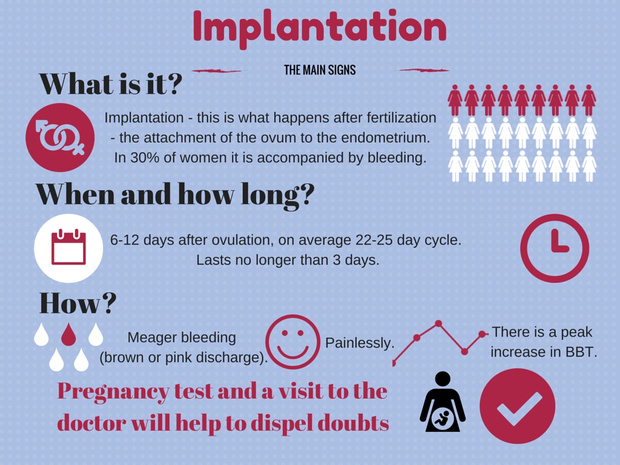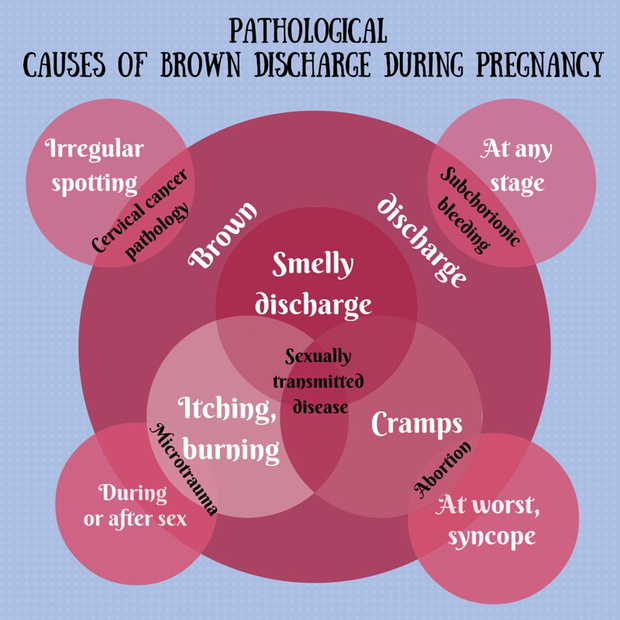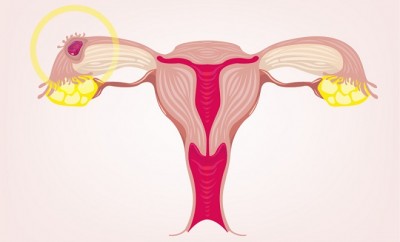Is Brown Discharge a Sign of Pregnancy? Find out Now
If you have been trying to get pregnant, every small change that your body experiences can be the cause for concern. In particular, if you have brown discharge, you might be extremely worried about the meaning of it. And indeed, such bleeding can be a sign of pregnancy, meanwhile, in combination with various symptoms, it may testify to absolutely different conditions. Sexually transmitted diseases, microtraumas and disturbance of the course of pregnancy are considered to be pathological causes of brown discharge. Telling the difference and prescribing medication is only up to the doctor.
Brown discharge – am I pregnant?
Occurrence of brown discharge shortly before the menstruation can be indicative of fertilization. This symptom occupies an important place among other pregnancy signs since it is a direct testimony of the ovum’s adhesion to the uterine mucous lining.
Implantation bleeding results from the affection of proliferated endometrial vessels during the implantation process. The fact is that the ovum secretes bioactive substances, which attenuate endometrial surface. This is done in order that to make it easier for the embryo to get fixed on the surface of the endometrium – “attaching itself” to the erosion and invading it deeper and deeper.
Such blood loss is not at all threatening and is considered to be absolutely natural while the ulcerated endometrial lining heals over in less than two weeks. Interestingly, its top layer becomes just as smooth as it used to be, and the development of a new living being is only “given away” by a small knobble (like an egg, hidden under a cover).
Can implantation bleeding be brown?
Brown implantation bleeding is the most common variant of discharge that accompanies attachment of the embryo. Dark color is determined by the fact that blood from minor vessels has time to coagulate while still in the cervix – on its way to the vagina.
It is also possible to observe pink discharge – this is how blood looks, being heavily diluted with mucus. This has to do with the fact that apart from meager bleeding, implantation discharge includes a large amount of cervical mucus, produced in the “sticky” estrogen phase.
Signs of implantation bleeding:
- IB occurs a few days prior to the anticipated period;
- It lasts no more than 3 days;
- It is painless;
- And is often followed by other early pregnancy signs.

What brown discharge means if you’re not pregnant
Apart from implantation bleeding, occurrence of brown discharge may be determined by multiple causes, which can be classified into two categories:
Physiological brown discharge:
- Ovulation bleeding is a discharge of blood from vessels, affected during the emergence of the ovum from the follicle. It is observed in the middle of the cycle and can be accompanied by dragging abdominal pain, associated with the process of ovulation.
- Adaptation bleeding occurs in the first 3-6 months of the adjustment to hormonal contraceptives.
Pathological discharge (some types of it can go along with pregnancy):
- Sexually transmitted diseases. The main characteristic feature of sexually transmitted diseases is smelly discharge with purulent admixtures, blood, and foam. It is usually accompanied by itching or burning in and around the vagina.
- In some cases, brown discharge may be the result of recent sexual activity. Slight traumas of the mucous lining can appear even after a visit to the gynecologist. It could also be caused by a recent vaginal examination if any cell samples were taken from your cervix. Cervix cell samples are removed with a small scraping tool, which can cause a little bit of bleeding, but nothing to be concerned about.
- Cervical oncology. Precancerous or malignant traumas of the cervical canal are able to provoke irregular bleeding, including bleeding after sexual intercourse.
- Subchorionic bleeding – discharge of blood, accumulated under the placental membrane. SCB is harmless as long as it does not provoke placental abruption.
- Disturbance of the course of pregnancy. It should be kept in mind that sex is contraindicated in case of uterine tonus during pregnancy since it can provoke miscarriage. There are general signs of disturbance of any type of pregnancy – previously normal, ectopic or developing without an embryo (“hidatidiform mole”).

Conditions that provoke brown discharge in pregnant women:
- Polycystic ovarian syndrome;
- Thyroid diseases and other hormonal disruption;
- Perimenopause;
- Uterine fibroid and endometrial cancer;
- Endometriosis and adenomyosis (pathologies of endometrial development);
- Blood coagulation disorders.
Diagnostics of causes of brown discharge
If all the signs indicate to implantation bleeding and in case of unprotected sex about three weeks prior to bleeding – it is appropriate to consider pregnancy. To dispel your doubts, you may choose to take a home pregnancy test, which is based on the detection of chorionic gonadotropin (“pregnancy hormone”) in urine. The test works no sooner than the first day of the delay (in case the package says “sensitivity from 20mlU/ml”).
Or you may undergo a laboratory blood analysis, which is able to confirm possible pregnancy 1-2 days earlier. It is important to keep in mind that apart from brown implantation bleeding, such symptoms as morning nausea, delay of a normal period, breast augmentation, etc., can also be indicative of pregnancy.

Note that brown discharge, which occurs after the supposed ovulation, must serve the ground for an immediate visit to the doctor. Miscarriage is an emergency case. It is characterized by excessive discharge of blood with clots, dragging abdominal pain, deterioration of the general condition and possibly, loss of consciousness.
Conclusions
If you are not certain whether or not you are pregnant, it is important to make an appointment to see a specialist to confirm the pregnancy. If you are concerned about brown discharge, you should report it to the gynecologist and work together with your doctor to determine the cause. In most cases, there is nothing to be concerned about, but it is always a good idea to have an examination to be certain that all is well.













